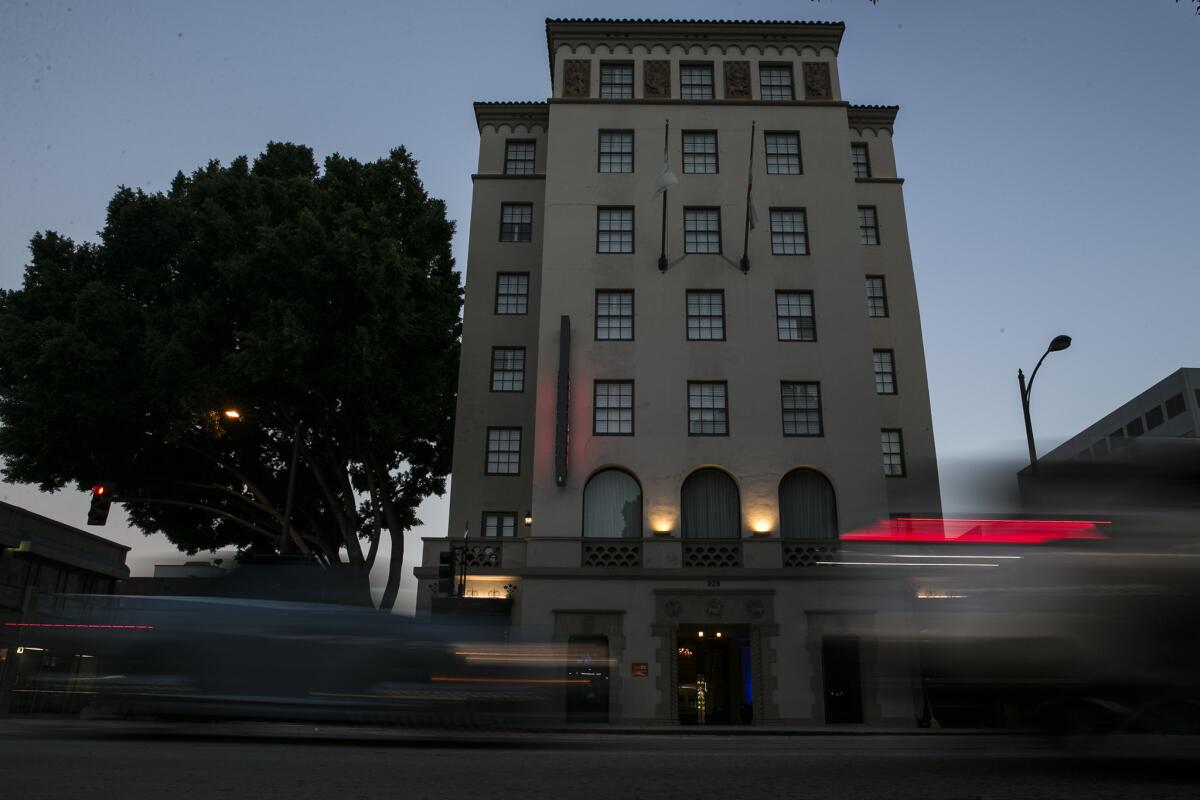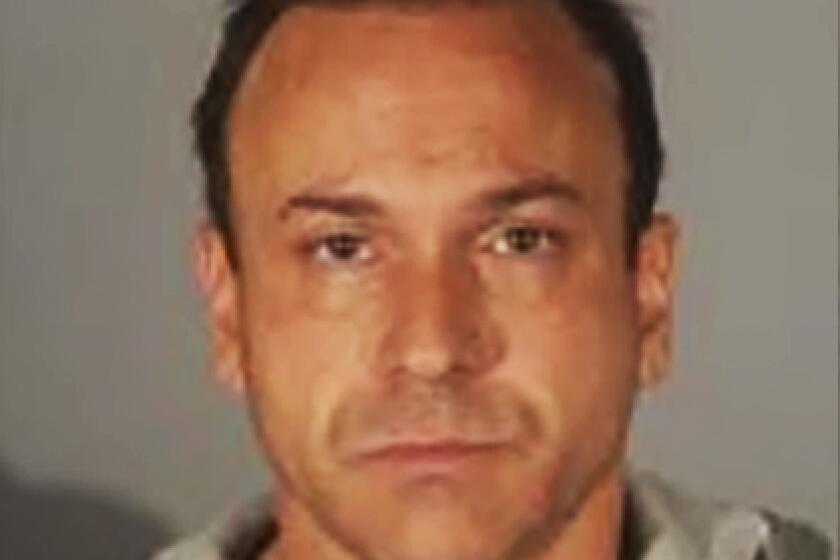Pasadena officer who investigated overdose was skeptical of USC med school dean’s story, recording shows

The police officer who last year questioned the then-dean of USC’s medical school at a hospital about his role in the drug overdose of a young woman expressed skepticism at Dr. Carmen Puliafito’s account.
The police officer who last year questioned the then-dean of USC’s medical school about his role in the drug overdose of a young woman expressed skepticism at Dr. Carmen Puliafito’s account, according to an audio recording that was made by the officer and released Tuesday.
Puliafito told the officer he was at the Pasadena hotel room where the overdose occurred as a family friend to help the woman, who was later rushed to Huntington Memorial Hospital.
The unidentified officer is asked by a social worker at the hospital what he thought of the account offered by Puliafito.
“You buy it?” says the social worker on the recording that Pasadena police released in response to a
“No,” the officer replies.
The social worker later laughs and says: “A friend of the father. Excuse me? That’s funny.”
The officer and social worker then speculated about Puliafito’s relationship with the woman and discussed the drugs and “provocative clothing” found at the scene.
Despite the officer’s doubts, a required report on the overdose at a Pasadena hotel was not filed until three months later, after The Times made repeated requests for information. No arrests were made.
In a statement Tuesday, Pasadena Police Chief Phillip L. Sanchez defended his department’s handling of the overdose, saying it lacked evidence to arrest Puliafito in connection with methamphetamine that officers found in the hotel room registered in his name. It remained unclear if the department followed up on its investigation after questioning Puliafito at the hospital.
The woman who overdosed, Sarah Warren, now 22, told The Times the police never interviewed her. About six hours after she overdosed, Warren said, Puliafito picked her up at the hospital and they returned to the hotel to resume using drugs.
Puliafito, 66, resigned as dean of the Keck School of Medicine three weeks after the overdose, saying he wanted to pursue opportunities in the biotech industry. His involvement in the incident was not publicly reported until The Times published an investigation last week that found Puliafito associated with a circle of younger criminals who said he abused drugs with them.

After he stepped down as dean, Puliafito remained on the USC faculty and continued to accept new patients, according to the school’s website.
The Pasadena police’s handling of Warren’s overdose and Puliafito’s involvement have been the subject of intense scrutiny and criticism.
Last week, Pasadena City Manager Steve Mermell sent a memo to council members saying that The Times’ account of the hotel incident “reflects poorly on the city and the Pasadena Police Department.”
“As indicated in the article, initially there was no police report made of the incident,” Mermell said. “There should have been and that was a failure on the part of our responding officer. Once this came to light, [police] undertook an appropriate investigation and ultimately the involved officer was the subject of disciplinary action.”
It’s unclear whether the officer in the recording was disciplined.
On Friday, USC administrators announced that Puliafito had been suspended from the faculty and barred from seeing patients, and that the school had begun the process to fire him.
The Medical Board of California has said it is investigating Puliafito, based on The Times report.
An overdose, a young companion, drug-fueled parties: The secret life of USC med school dean »
The overdose occurred March 4, 2016, at the Hotel Constance on Colorado Boulevard. A hotel employee called 911 to report an apparent overdose. On the recording, Puliafito is heard identifying himself as a doctor and saying the woman was his girlfriend. He told the 911 dispatcher that the woman “had a bunch of drinks and she’s sleeping.”
Paramedics arrived at the hotel and took Warren to the hospital. The police officer met Puliafito at the hospital, where he interviewed the doctor.
On the police officer’s recording, Puliafito can be heard telling the officer that he’s a friend of Warren’s father.
When asked if he has a “romantic relationship” with Warren, Puliafito responds “no.”
Puliafito said he “thought she was sleeping, and she was breathing and you know, and hadn’t thrown up or anything.”
“You as a doctor, did you notice anything that would have alarmed you?” the officer asked.
Puliafito responded that he was an ophthalmologist and eye surgeon.
“So not an emergency medicine physician. I mean, I basically looked at her respirations, you know,” he said. “When I saw her at the beginning, she was responding to me.” Later, he said, Warren “didn’t seem to be waking up.”
A witness to the incident told The Times of phoning USC President C.L. Max Nikias’ office, giving two employees an anonymous account of the overdose and demanding that USC take action against Puliafito.
Phone records reviewed by The Times showed the witness made a six-minute call to Nikias’ office on March 14, 2016, 10 days after the overdose.
Last week, Puliafito’s successor as dean, Dr. Rohit Varma, told a gathering of scores of students that USC had found “no evidence, particularly, of that phone call.”
But on Tuesday, a crisis management specialist representing USC, Charles Sipkins, said that Nikias’ office did receive an anonymous call about Puliafito’s presence at the hotel overdose. However, the anonymous report did not make it to top university officials, Sipkins said.
ALSO
Steve Lopez: Yet another USC scandal requires blunt talk about money culture and values on campus
Drug allegations involving former USC medical school dean are probed by Medical Board of California
Former USC medical school dean no longer seeing patients; Pasadena police discipline officer
Sign up for Essential California
The most important California stories and recommendations in your inbox every morning.
You may occasionally receive promotional content from the Los Angeles Times.











